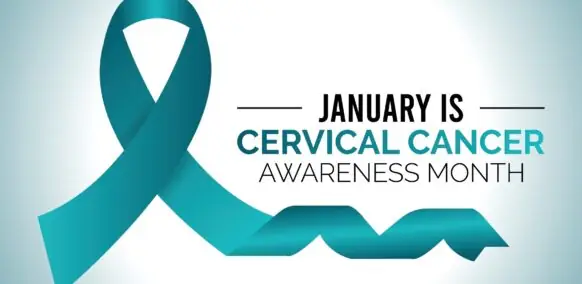Cervical Cancer Awareness Month
January is Cervical Cancer Awareness Month a month dedicated to cervical health and cervical cancer prevention and taking steps to help eliminate this preventable cancer.


As it is cervical cancer awareness month, it gives everyone the opportunity to remind themselves about the symptoms of cervical cancer and the steps that we can take to help prevent it. Cervical cancer prevention week also runs from January 22nd to January 28th offering an opportunity to focus on education and proactive health steps.
The Eve Appeal (The Gynaecological Cancers Charity) highlights that cancer of the cervix can affect anyone with a cervix at any age, although it is most common between the ages of 30-34.
3,250 people are diagnosed with cervical cancer each year in the UK (Source The Eve Appeal). The most common symptoms are:
- Vaginal bleeding during or after sex
- Bleeding in between periods
- Bleeding after the menopause
- Lower back or pelvic pain
- Pain or discomfort during sex
- Changes to vaginal discharge.
The NHS confirmed, in 2023, their pledge to eliminate cervical cancer by 2040 (Source NHS England). A large amount of cervical cancers are caused by the human papillomavirus (HPV). Since 2008, a HPV vaccine has been available and it is now offered to all young people as part of their school vaccination programme. The vaccine should also now be available to anyone else who may need it and we would encourage you to speak to your Health Professional if you feel that the vaccine is something that could benefit you. The HPV vaccine has been shown to reduce the number of cervical cancers by 90%.
Cervical screening is also a key examination that people can have to help prevent cervical cancer. Recent figures demonstrated that around 26% of eligible women over 50 years old had failed to attend their screening appointment (Source Cambs Times), despite the fact that 75% of cervical cancers can be prevented by early screening. The failure to attend appointments could be due to the fact that some people feel uncomfortable or anxious about having the screening done or, in our busy lives, they could struggle to arrange an appropriate time for the appointment. We would urge everyone to attend these appointments. The Health Professionals will make every effort to make you feel as comfortable as possible and the examination only takes around 10 minutes. That 10 minutes could prevent you from developing cervical cancer and from having to undergo much more extensive treatment.
If you are diagnosed with cervical cancer, then as with all cancers, the earlier it is detected the better. Treatment is usually through surgery and then potentially chemotherapy, radiotherapy and/or brachytherapy depending on how advanced the cancer is. A lot of research is still being done into cervical cancer and, only last year, Cancer Research UK confirmed that results from recent trials had shown that giving cervical cancer patients a short course of chemotherapy before starting the standard treatment cuts the risk of death by 40% (Source Cancer Research UK).
Sadly, even though a lot of work is being done to prevent cervical cancer, mistakes can still be made in people’s treatment. Screening tests can be misread/misreported, there can be delays in people being referred for treatment or errors made in the treatment itself. Please see our page dedicated to cancer misdiagnosis claims for more information.
Steps to Take
If you or a loved one is concerned about their treatment, they could take the following steps:
- Consult a Specialist: Seek an independent medical opinion to assess whether the care you received was appropriate. You are entitled to ask for a second opinion regarding your treatment and your options.
- Make a Complaint: Whether your care has been provided through the NHS or privately, you are entitled to make a complaint if you feel you’ve been let down.
- Speak to Charities: There are lots of Charities – for example, The Eve Appeal, UK Cervical Cancer and Cancer Research UK – that can offer support and guidance.
- Request Medical Records: Gather all relevant medical documents that may help you to assess your treatment and to seek advice/guidance.
- Speak to a Lawyer: Contact a legal professional who specialises in medical negligence claims to discuss your options.
- Act Promptly: Be mindful of time limits, and take action as soon as possible.
If you believe you’ve experienced medical negligence related to cervical cancer care, it’s critical to act promptly as legal claims often have time limits. A legal or medical professional can guide you through your specific rights and next steps.
Sources
Cervical cancer treatment breakthrough cuts risk of death by 40% – Cancer Research UK – Cancer News
Cervical cancer: Eight women develop cancer ‘after smear misread’ – BBC News
Cervical cancer: One in three women over 50 not screened | Cambs Times
https://eveappeal.org.uk/information-and-advice/gynaecological-cancers/cervical-cancer/